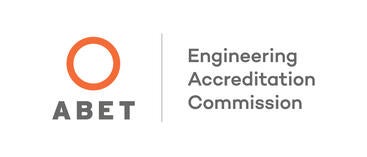The Bachelor of Science in Materials Science and Engineering (MSE) Program is accredited by the Engineering Accreditation Commission (EAC) of ABET http://www.abet.org/, under the commission's General Criteria and Program Criteria for Materials (1), Metallurgical (2), Ceramics (3) and Similarly Named Engineering Programs.
Bourns College of Engineering Mission Statement
The overall vision of BCOE is “To Become a Nationally Recognized Leader in Engineering Research and Education.” In support of the vision, BCOE’s goal is to create the profile of a Top 25 Engineering School. BCOE’s mission is to:
-
Produce engineers with diverse backgrounds with the educational foundation and adaptive skills to serve rapidly evolving technology industries;
-
Conduct nationally recognized engineering research focused on providing a technical edge for the USA;
-
Contribute to knowledge of both fundamental and applied areas of engineering;
-
Provide diverse curricula that will instill in our students the imagination, talents, creativity and skills necessary for the varied and rapidly changing requirements of modern life;
-
Enable our graduates to serve in a wide variety of positions that require leadership, teamwork, decision making and problem-solving abilities; and
-
Be a catalyst for industrial growth and social mobility in the Inland Empire.
Bachelor of Science in Materials Science and Engineering Program Educational Objectives (PEOs)
The graduates of the MSE program will:
-
be successful in both education and industry;
-
will be recognized for professionalism and leadership in cutting edge interdisciplinary materials science and engineering practices;
-
improve existing systems and innovate and design next generation technologies; and
-
contribute effectively as individuals, team members, and/or leaders to achieve personal, group and institutional goals.
Bachelor of Science in Materials Science and Engineering Student Outcomes (SOs)
To prepare students to attain the Program Educational Objectives we adopted the ABET student outcomes (1) through (7):
-
an ability to identify, formulate, and solve complex engineering problems by applying principles of engineering, science, and mathematics
-
an ability to apply engineering design to produce solutions that meet specified needs with consideration of public health, safety, and welfare, as well as global, cultural, social, environmental, and economic factors
-
an ability to communicate effectively with a range of audiences
-
an ability to recognize ethical and professional responsibilities in engineering situations and make informed judgments, which must consider the impact of engineering solutions in global, economic, environmental, and societal contexts
-
an ability to function effectively on a team whose members together provide leadership, create a collaborative and inclusive environment, establish goals, plan tasks, and meet objectives
-
an ability to develop and conduct appropriate experimentation, analyze and interpret data, and use engineering judgment to draw conclusions
-
an ability to acquire and apply new knowledge as needed, using appropriate learning strategies
Enrollment and Graduation Data
| Year | New Freshman Enrollment | New Transfers Enrollment | Total UG Enrollment | Total UG Degrees Granted |
|---|---|---|---|---|
| 2008-09 | 15 | 0 | 17 | - |
| 2009-10 | 14 | 1 | 31 | 1 |
| 2010-11 | 20 | 1 | 53 | 6 |
| 2011-12 | 4 | 2 | 39 | 6 |
| 2012-13 | 9 | 4 | 47 | 5 |
| 2013-14 | 25 | 2 | 64 | 12 |
| 2014-15 | 18 | 3 | 62 | 9 |
| 2015-16 | 16 | 6 | 74 | 7 |
| 2016-17 | 28 | 6 | 88 | 13 |
| 2017-18 | 25 | 6 | 93 | 26 |
| 2018-19 | 29 | 5 | 97 | 12 |
| 2019-20 | 47 | 5 | 123 | 14 |
| 2020-21 | 22 | 3 | 114 | 22 |
| 2021-22 | 21 | 5 | 106 | 25 |
| 2022-23 | 19 | 3 | 95 | 19 |
| 2023-24 | 18 | 0 | 81 | - |
| 2024-25 | - | - | - | - |
Interdepartmental ABET Contacts:
| Department | Coordinator | |
|---|---|---|
| Bioengineering | Robert McKee | rmckee@engr.ucr.edu |
| Chemical & Environmental Engineering | Jiamin Zhang | jiamin.zhang@ucr.edu |
| Electrical and Computer Engineering | Roman Chomko | chomko@ece.ucr.edu |
| Computer Science & Engineering | Eamonn Keogh | eamonn@cs.ucr.edu |
| Materials Science & Engineering | Perry Cheung | pcheung@engr.ucr.edu |
| Mechanical Engineering | Sundar V | vsundar@engr.ucr.edu |
